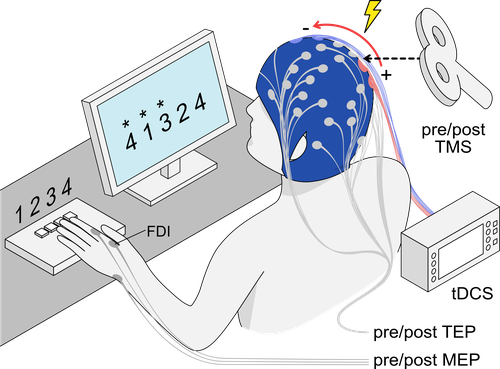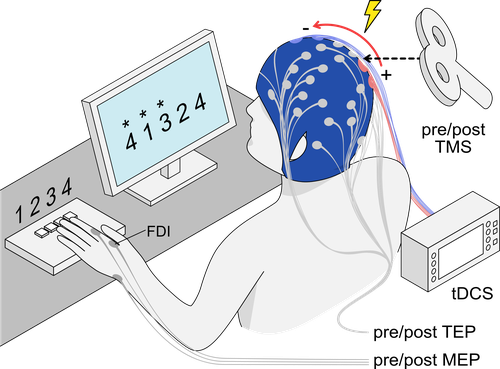ARTEMENKO Christina 
- Department of Psychology, University of Tuebingen, Tuebingen, Germany
- Life Sciences
- recommender
Recommendations: 2
Reviews: 0
Areas of expertise
RESEARCH CORE TOPIC
arithmetic development across the lifespan
RESEARCH FIELDS
developmental cognitive neuroscience, educational neuroscience, numerical cognition
RESEARCH METHODS
neuroscientific methods (fNIRS, tDCS/tRNS), behavioral methods (experiments, online studies), developmental research designs (longitudinal/cross-sectional studies, interventions)
RESEARCH TOPICS
numerical cognition, arithmetic complexity, arithmetic development, math anxiety, dyscalculia
Recommendations: 2
Dose-response of tDCS effects on motor learning and cortical excitability: a preregistered study
Increasing stimulation intensity does not affect motor learning
Recommended by Christina Artemenko based on reviews by 1 anonymous reviewerIn neurostimulation research, the parameters of a stimulation protocol crucially impact on the effects of the stimulation. Transcranial direct current stimulation (tDCS) is a neurostimulation technique that typically uses current intensities about 1-2 mA in human research to modulate motor and cognitive behavior. The current sham-controlled study by Hsu et al. (2024) applies current intensities not only of 2 mA but also of 4 mA and 6 mA and thus extends our understanding of stimulation parameters while ethical standards are preserved.
The influence of tDCS over the primary motor cortex was evaluated for neural plasticity during motor learning. Stimulation effects were tested not only behaviorally but also physiologically by motor evoked potentials elicited by transcranial magnetic stimulation (TMS). The presented pilot data were promising and underlined the feasibility of the proposed research design. The study contributes to tDCS research by uncovering reasons for controversial findings and thus increases reproducibility.
The results of the study unexpectedly revealed no stimulation effects on motor learning, neither for behavioral outcomes nor for physiological outcomes by motor evoked potentials. No evidence was found that stimulation effects linearly increase with increasing intensity. Interestingly, higher intensities were relatively well tolerated - but did not have any impact. The current findings underline the purpose of preregistrations and registered reports to act against publication bias, particulary in the field of neuromodulation. In the current case, failed replication and null findings - revealed by a methodologically sound study - are crucial to inform future research using similar stimulation protocols with the aim to modulate motor or cognitive behavior.
The Stage 2 manuscript was evaluated over one round of review. Based on detailed responses to reviewers’ and the recommender’s comments, the recommender judged that the manuscript met the Stage 2 criteria and awarded a positive recommendation.
URL to the preregistered Stage 1 protocol: https://osf.io/jyuev
Level of bias control achieved: Level 2. At least some data/evidence that was used to answer the research question had been accessed and partially observed by the authors prior to Stage 1 in-principle acceptance, but the authors certify that they had not yet observed the key variables within the data that were used to answer the research question.
List of eligible PCI RR-friendly journals:
Level of bias control achieved: Level 2. At least some data/evidence that was used to answer the research question had been accessed and partially observed by the authors prior to Stage 1 in-principle acceptance, but the authors certify that they had not yet observed the key variables within the data that were used to answer the research question.
List of eligible PCI RR-friendly journals:
References
Hsu, G., Jafari, Z. H., Ahmed, A., Edwards, D. J., Cohen, L. G., & Parra, L. C. (2024). Dose-response of tDCS effects on motor learning and cortical excitability: a preregistered study [Stage 2]. Acceptance of Version 2.1 by Peer Community in Registered Reports. https://osf.io/a42uy
05 Jun 2024

STAGE 1

Dose-response of tDCS effects on motor learning and cortical excitability: a preregistered study
How stimulation intensity affects motor learning
Recommended by Christina Artemenko based on reviews by Charlotte Wiltshire and 1 anonymous reviewerIn neurostimulation research, the parameters of a stimulation protocol crucially impact on the effects of the stimulation. Transcranial direct current stimulation (tDCS) is a neurostimulation technique that typically uses current intensities about 1-2 mA in human research to modulate motor and cognitive behavior. The current sham-controlled study by Hsu et al. (2024) applies current intensities not only of 2 mA but also of 4 mA and 6 mA and thus extends our understanding of stimulation parameters while ethical standards are preserved.
The influence of tDCS over the primary motor cortex will be evaluated for neural plasticity during motor learning. Stimulation effects will be tested not only behaviorally but also physiologically by motor evoked potentials elicited by transcranial magnetic stimulation (TMS). The presented pilot data are promising and underline the feasibility of the proposed research design. The study will contribute to tDCS research by uncovering reasons for controversial findings and thus increase reproducibility.
The Stage 1 manuscript was evaluated over two rounds of in-depth review. Based on detailed responses to the reviewers' comments, the recommender judged that the manuscript met the Stage 1 criteria and therefore awarded in-principle acceptance (IPA).
URL to the preregistered Stage 1 protocol: https://osf.io/jyuev
Level of bias control achieved: Level 2. At least some data/evidence that will be used to answer the research question has been accessed and partially observed by the authors, but the authors certify that they have not yet observed the key variables within the data that will be used to answer the research question.
List of eligible PCI RR-friendly journals:
Level of bias control achieved: Level 2. At least some data/evidence that will be used to answer the research question has been accessed and partially observed by the authors, but the authors certify that they have not yet observed the key variables within the data that will be used to answer the research question.
List of eligible PCI RR-friendly journals:
References
Hsu, G., Edwards, D. J., Cohen, L. G., & Parra, L. C. (2024). Dose-response of tDCS effects on motor learning and cortical excitability: a preregistered study. In principle acceptance of Version 1.3 by Peer Community in Registered Reports. https://osf.io/jyuev
